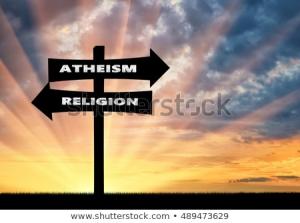Over the years that I have been writing this blog, those who describe themselves as non-believers or atheists have frequently expressed a consistent confusion and frustration. It usually goes something like this: “How can someone who seems to be relatively normal and intelligent believe in something without any evidence?” I don’t get defensive when asked this and similar questions—I don’t want to be that sort of Christian.  I often reply by suggesting that there is evidence to support my faith, just not a sufficient amount of the sort of “factual” evidence that they are looking for. This often opens the door to a conversation that is both interesting and civil, the sort of conversation that seems to be less and less common these days.
I often reply by suggesting that there is evidence to support my faith, just not a sufficient amount of the sort of “factual” evidence that they are looking for. This often opens the door to a conversation that is both interesting and civil, the sort of conversation that seems to be less and less common these days.
I fully understand being confused about why someone might belief something on the basis of either insufficient or non-existent evidence. We live in a world in which all sides accuse everyone who disagrees with them of doing exactly that. From my corner of the belief spectrum, I regularly accuse MAGA folks, anti-vaxxers, the Q-Anon faithful, and those who believe that there was widespread fraud in the November 2020 election that Joe Biden stole as choosing to have their heads up their asses instead of simply accepting the glaring evidence that proves them to be wrong. I admit that it occasionally is disconcerting to realize that the atheist commenters on my blog consider me to be just as blind to glaring evidence (or the glaring fact that there is no evidence to support my faith).
Sometimes it’s helpful to step back from the heightened emotion and energy of the moment and take a larger view of the phenomenon in question. I will have the opportunity to do just that on a couple of occasions over the next two or three weeks in the interdisciplinary course I teach. It turns out that when it comes to the dynamic of human belief and commitment, the more things change the more they stay the same. We will be studying John Stuart Mill’s The Subjection of Women within just a few classes. Mill was one of the most important and interesting intellectuals, philosophers, and social advocates of the 19th century; this particular text is a clarion call for full legal equality for women in England that was well ahead of its time.
In the England of Mill’s day, women could not vote, they could not own property, they had few if any legal rights, and their very existences were essentially owned by the men in their lives: father, husband, brother, or closest male relative. A woman’s children were the property of their father. Mill knew that although his argument pressing back against these injustices and inequities was strong, he was swimming against a tide that was far stronger than anything mere logic could overcome.
This caused him to reflect on what entrenches people in positions and beliefs far more deeply than facts and evidence.
So long as an opinion is strongly rooted in the feelings, it gains rather than loses in stability by having a preponderating weight of argument against it . . . The worse it fares in argumentative context, the more persuaded its adherents are that their feeling must have some deeper ground, which the arguments do not reach.
We see this over and over again in contemporary debates and arguments, particularly the stakes are perceived to be particularly high. There is no rational accounting for worldviews and beliefs that are impervious to logic and immune from argument.
Our primary text in class this week is Steven Johnson’s The Ghost Map, a gripping account of a deadly cholera epidemic that broke out in London’s Soho district in 1854. Soho was overcrowded and impoverished; the dominant explanation for the outbreak was the “miasma” theory (the word comes from the Greek word for “pollution”), which proposed that diseases such as cholera are the result of breathing the foul air produced by rotting organic matter. This thoroughly incorrect and debunked theory, held at the time by high-ranking medical officials and much of the general populace, proved to be remarkably resilient even when the dogged research of various individuals living in Soho, including a young physician and an intrepid Anglican minister, provided incontrovertible evidence that traced the source of the epidemic to polluted water sources and pumps.
Among other things, The Ghost Map is an extended exploration of how knowledge grows and progress is made in the face of stubborn and entrenched beliefs that happen to be demonstrably wrong. Johnson writes that intellectual history, more often than not, is
Not the history of breakthroughs and eureka moments, but instead the history of canards and false leads, the history of being wrong. Whenever smart people cling to an outlandishly incorrect idea despite substantial evidence to the contrary, something interesting is at work.
“Interesting,” for sure. I would add that, both in 1854 London and in our country in 2021, “dangerous” is an equally appropriate description.
To use a phrase that is overused by talking heads on 24-7 news channels, let me be perfectly clear. I don’t relish the idea that those who don’t share my commitment to the life of faith very well may judge my beliefs in the same way that I judge those who believe that the 2020 presidential election was stolen. Not favorably, in other words. Learning how to write and talk about my faith with all sorts of people, including those who conclude that I am choosing to believe on the basis of little or no evidence, is an ongoing process, one that I track frequently in this blog.
I came across something the other day in the latest mystery by Donna Leon that I’m reading that I find helpful in this process. Guido Brunetti, the police captain who is the main character in the series, is in conversation with his mother-in-law. Brunetti is an atheist; he knows that his mother-in-law believes in God. He is afraid he has offended her by saying that he is an unbeliever and atheist.
That could hardly offence me, Guido, since I think it’s an entirely sensible position. I’ve CHOSEN to believe in God. In the face of convincing evidence to the contrary and in the complete absence of proof–well, anything a right-thinking person would consider as proof–of God’s existence. I find that it makes life more acceptable, and it becomes easier to make certain decisions and endure certain losses. But it’s a choice on my part, only that, and so the other choice, the choice not to believe, is entirely sensible to me.
I’m not sure I see it as a choice.
Of course it’s a choice. We’ve both been presented with the same evidence, or lack of evidence, and we each choose to interpret it in a particular way. So of course it’s a choice.
Brunetti’s mother-in-law’s comments are pretty close to where my faith is located on most days.













